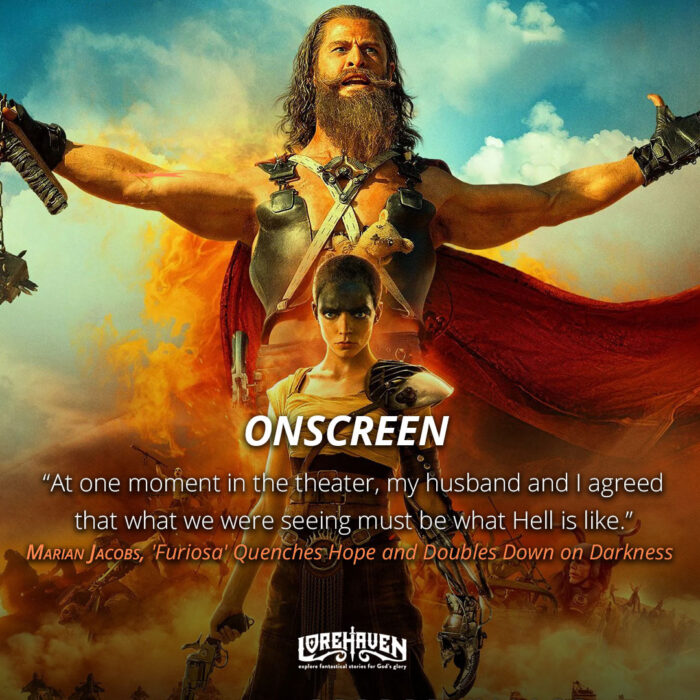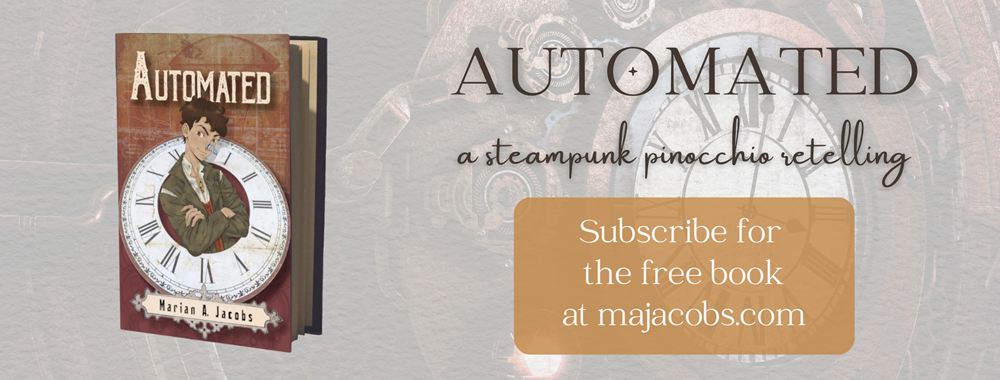‘Furiosa’ Quenches Hope and Doubles Down on Darkness
Mad Max: Fury Road was a box office hit in 2015, so it came as no surprise when Warner Bros. Pictures announced a prequel featuring the enigmatic Furiosa in her youth. I’d enjoyed the tenacity and hope she brought to the desolate, post-apocalyptic landscape of Fury Road and was looking forward to the prequel.
Enough time has passed since Furiosa’s theatrical release in May that I’d like to give a full review of the film, including spoilers.
Normally I might warn you away from reading this until after seeing the film yourself, but in this case, I hope to spare you from having to see it at all.
The film opens with an Edenic scene of lush greenery, insects, and fruit ready for harvest. The child Furiosa (Alyla Browne) and her friend are out picking a peach when they hear men’s voices—strangers’ voices. In their isolated and highly protected paradise, surrounded by a nearly waterless wasteland, these men are a threat to their peoples’ safety and secrecy.
Furiosa attempts to sabotage the men’s motorcycles, but she’s caught and kidnapped. Her mother follows the men back to their bloodthirsty gang, killing most of them along the way. In the end, she’s unsuccessful in rescuing her daughter and is brutally murdered before Furiosa’s eyes. But before she dies, she leaves her child with one gift—the peach seed. Now a young adult, Furiosa (Anya Taylor-Joy) conceals this treasure for years as she fights to survive the violence of a debauched, anarchist society.
The gang leader and murderer of Furiosa’s mother, Dementus (Chris Hemsworth), keeps the girl with him for some time before she’s eventually traded away. Years later, they cross paths once more, with Furiosa still harboring a deep bitterness for her mother’s murderer. In the film’s final confrontation, she’s faced with a choice—let him go in the desert where he will likely die of thirst or take her revenge through murder.
Where the world of Fury Road was depraved and violent, Furiosa somehow managed to take this darkness a few steps further. At one moment in the theater, my husband and I agreed that what we were seeing must be what Hell is like—hideous, disgusting, and utterly devoid of all goodness.
Similarly, in Fury Road the character of Furiosa had been a beacon of hope, but this addition to her story left her in the pit of raging hatred for her enemy. She didn’t choose to take his life in the end nor let him go. Instead, she took her revenge using a far more grotesque method that would torture and humiliate him for years to come.
I wish I hadn’t seen this film so I would have been spared the final image of his fate, which is now seared into my mind. (If you don’t wish to picture it either, skip the rest of this paragraph.) As the film comes came to an end, the camera looks down upon the gaunt yet living figure of Dementus laying atop a stream—one of their only sources of water in the wasteland. And from his groin grows a young peach tree.
This film began with so much hope for Furiosa. Even knowing the story of Fury Road, which revealed that she wouldn’t return to her childhood home, the beginning still promised real depth. She had been kidnapped from Eden and delivered to the pit of Hell. What incredible potential to develop her into that same stalwart beacon of hope and light we came to know in Fury Road. Yet in the end, Furiosa twisted her into a mere revenge story without depth or heart. From the treasure of her peach seed and their society’s only source of running water did not come life, only more depravity and death.
This story should have whispered of future hope and life after death. Yet the meaningless of revenge and mixed symbolism in the final moments only preached an anti-gospel message.






























Respectfully Ms. Jacobs, I don’t agree with your conclusions. ‘Fury Road’ is one of my all time favorite movies and to me, the prequel more than lived up to the hype. Honestly, the entire premise of Mad Max is built off of chaos, destruction and violence and the prequel was no different. I felt that ‘Furiosa’ did a much better job at world building than ‘Fury Road’ and also made Furiosa’s character arc more dramatic.
Granted the themes of revenge don’t line up with the gospel. On the other hand, sometimes heroes have to go into their own darkness, before becoming greater. Sort of like Hawkeye in ‘The Avengers: Endgame’ surrendering to his feelings of hatred and revenge, before Black Widow sacrifices her life for his. Even in ‘Lord of the Rings’ Frodo nearly succumbs to the power of the One Ring, and it is actually Gollum, twisted and depraved Gollum who ends up destroying the Ring.
Anyway that’s just my two cents. I really enjoy your writing and plan on addressing these very issues on my blog.
I have to agree with Andrew. I totally agree that Furiosa presents an anti-Gospel message… but, um… what were you expecting? The entire Mad Max series is post-apocalyptic mayhem and revenge and creative ways to kill people and blow things up. I guess there’s kind of a redemption message in the overall arc of Mad Max… maybe?
I don’t disagree with your conclusion, just your presenting this as a startling realization.
Just as an aside, if someone is a staunch Christian to the point where they are uncomfortable seeing non-Gospel or even anti-Gospel messages or themes, what was it about Furiosa that would lead any such Christian to think this movie might be a good fit for them? If you have come to that sort of conviction (perfectly laudable) I would assume that means you’re an adult, and by that point in your life, you’ll have seen enough films and TV to know that the chaos of Furiosa/Mad Max isn’t going to have any strong Gospel messages in it.
Great review! I agree that Furiosa’s world is incredibly dark and unforgiving. It reminds me of some of the grimdark fantasy novels I’ve been reading lately. Have you ever read Lоса Deserta? It explores similar themes of survival and hope in a dystopian setting. I highly recommend it if you enjoy this kind of story! https://zelluloza.ru/search/genres/2-Fentezi/